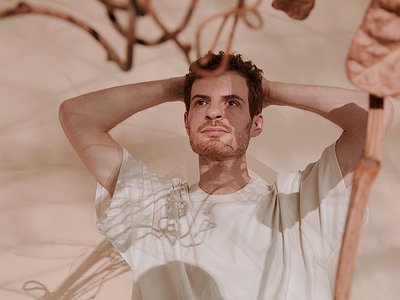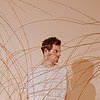Could you take us through a day in your life, from a possible morning routine through to your work? Do you have a fixed schedule? How do music and other aspects of your life feed back into each other - do you separate them or instead try to make them blend seamlessly?
This is a difficult question to answer. I have a fixed schedule, but I am constantly breaking it. Early mornings are sacred. Minimal talking or phone use. Running, swimming or meditation instead. Connection to the world is established at breakfast. News and social media but also Paul Horn. Then timely emails or straight into sound. At its best, inspiration takes hold and time is irrelevant. Most days begin with a few hours of experimentation. Then a shift to admin or emailing work followed by a return to sounds with fresh ears. Whatever the routine may be, spending some time outside is top priority. I have conflicting feelings toward productivity and how one should spend their time. This is the topic of my latest record.
Could you describe your creative process on the basis of a piece or album that is particularly dear to you, please? Where did the ideas come from, how were they transformed in your mind, what did you start with and how do you refine these beginnings into the finished work of art?
The entire process behind On Hold was the most effortless and enjoyable work to date. It was born out of a frustrating moment when my friend Sam was put on hold for an hour due to a lost credit card. I recorded the call waiting music and began manipulating it live. The results were so satisfying that I spent the next 2 weeks recording hold music through the phone. I spent less than an hour with each track, using the same effect chain and quick cutting, pasting, looping. It is my only project to date with clear limitations. The vision was realized immediately and as a result, little to no post editing was necessary. While this record is beat-less and ambient, I hope to apply the same method to a full studio album.
There are many descriptions of the ideal state of mind for being creative. What is it like for you? What supports this ideal state of mind and what are distractions? Are there strategies to enter into this state more easily?
The best form of tunnel vision. When you see beyond the screen. When you see beyond strings, keys, filters, brass, envelopes and 1s & 0s. When your mind does not discern musical choices as correct or incorrect. When you listen beyond genre and classification. I am always working toward ways to sustain this state. Self-doubt and self-criticism are the biggest roadblocks for me. At least I know now, when forces align and a flow state is present, I drop everything and ride the wave.
How is playing live and writing music in the studio connected? What do you achieve and draw from each experience personally? How do you see the relationship between improvisation and composition in this regard?
For me, it is typically not connected enough. I will admit, I do find it hard to channel live energy at home. I do not feel like I have fully tapped into that energy yet in production. I am working to bring the same rawness and energy that I get while drumming/performing into production and songwriting where overthinking and perfectionism can strip an idea of its life.
I love the combination of improvisation and composition. I extract a lot of melodies and motifs from free spontaneous improvisation. I am always striving to tweak and develop my live show to strike this balance and allow room for more improvisation.
How do you see the relationship between the 'sound' aspects of music and the 'composition' aspects? How do you work with sound and timbre to meet certain production ideas and in which way can certain sounds already take on compositional qualities?
I see strange, esoteric, or “unclassifiable” sounds on an equal playing field as traditional key components of composition. Instead of treating these sounds as a “freak out moment”, I like integrating them as a motif or hook. Finding a middle ground where common sounds support the uncommon and vice versa. Ex. Synths and acoustic instruments. It’s this combination of timbre, melody and songwriting that is most thrilling to me.
Our sense of hearing shares intriguing connections to other senses. From your experience, what are some of the most inspiring overlaps between different senses - and what do they tell us about the way our senses work? What happens to sound at its outermost borders?
I have always associated timbre with material and substance. Rubber, Plastic, Wood, Liquid to be hollow, flimsy, thin, thick. I think sound has a way of coming full circle at its outermost borders. Sometimes the farther you go, the closer to home. Pushing a sound farther and farther and then suddenly, you have created foley. A flute through flange, crystalizing pitch and modulating delay becomes water. I think this is most evident when you play a heavily manipulated sound for someone who knows nothing of the technicalities behind sound design or electronic music. They give their honest feedback and often relate the sound to something in the known world. It is a great perspective for folks like myself who are deep in it.
Art can be a purpose in its own right, but it can also directly feed back into everyday life, take on a social and political role and lead to more engagement. Can you describe your approach to art and being an artist?
In the process of writing Walking Hours, I had trouble justifying my time in the studio. The hours spent inside, working solo, felt self-centred and I had trouble connecting them to the world. I wanted to speak more directly to overstimulation, capitalism, racism, and environmental destruction. This urged me to use my voice more and speak directly. On past instrumental based records, I’ve always strived to reach as many people as possible through combinations of familiar and abstract sound in the hopes to provide a gateway to deeper territory. To provide a new perspective or diversion within traditions of sound and genre. Music is one of the most effective ways to positively transform perspectives and break down boundaries across the world.
It is remarkable, in a way, that we have arrived in the 21st century with the basic concept of music still intact. Do you have a vision of music, an idea of what music could be beyond its current form?
I think the basic concept of music will always be intact. It is a vital nutrition in all climates and all times. I wonder if we will revert back and expand upon older traditions of folk music with an emphasis on communal performance over production and recording. I think there will always be drums. There will always be rhythm.






